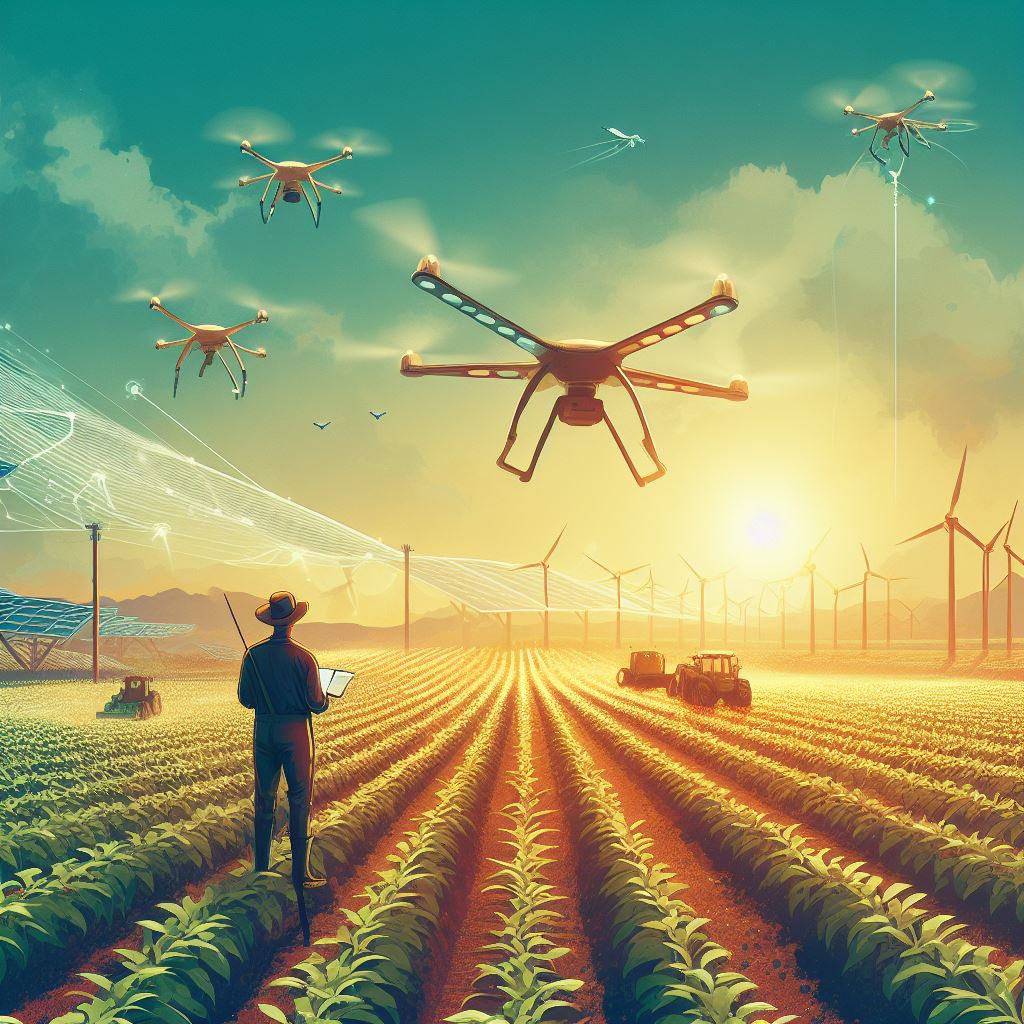Future of Farming: Tech against Climate Change
Last Updated on March 2, 2024
Introduction
In the evolving landscape of agriculture, technology emerges as a resilient ally against climate change.
Drones monitor crops, optimizing resource use.
Smart irrigation systems conserve water, enhancing sustainability.
Precision farming employs AI to analyze data, boosting efficiency.
Vertical farming rises, minimizing land usage.
Farming Tech against Climate Change
Robotics revolutionize labor, increasing productivity.
Advanced sensors detect diseases early, preventing crop loss.
The future of farming intertwines with tech, forging a sustainable path in the face of climate challenges.
Embracing innovation, farmers cultivate resilience, ensuring a bountiful tomorrow despite a changing climate.
Impact of Climate Change on Agriculture
Increase in extreme weather events
- Hurricanes, droughts, floods, and heatwaves are becoming more frequent due to climate change.
- These extreme weather events cause soil erosion, damage to crops, and loss of livestock.
- Farmers have to bear the brunt of these natural disasters, leading to financial instability and food scarcity.
- The increased frequency and intensity of extreme weather events are a direct result of climate change.
Changes in temperature and precipitation patterns
- Rising temperatures negatively affect crop growth and development.
- Some crops are sensitive to temperature changes and fail to produce desired yields in warmer climates.
- Changes in precipitation patterns bring about either significant droughts or excessive rainfall.
- These alterations in temperature and precipitation disrupt the delicate balance required for proper crop growth.
Threat to crop yields and food security
- Climate change poses a significant threat to global food security and crop yields.
- Droughts decrease the availability of water resources, leading to lower crop yields.
- Increased temperatures and CO2 levels affect pollination and reduce crop productivity.
- Pests and diseases also thrive under changing climatic conditions, further impacting crop health.
- The threat to crop yields directly affects food availability and affordability, putting food security at risk.
- Growing populations and food demand make it essential to develop resilient agricultural practices to combat these threats.
- Farmers must adapt to the changing climate through sustainable and innovative farming methods.
- Utilization of technological advancements can help counter the negative effects of climate change.
- Precision agriculture techniques, such as the use of sensors and drones, can aid in efficient resource management.
- These technologies provide real-time data on soil moisture, nutrient levels, and crop health, optimizing farming practices.
- Genetic modification and breeding techniques can create crops resistant to drought, pests, and diseases.
- Crop diversification and switching to more resilient varieties can help mitigate climate-related risks.
- Implementing sustainable irrigation systems and water management strategies can combat water scarcity.
- Conservation agriculture practices, such as minimum tillage and cover crops, improve soil health and mitigate erosion.
- Investing in renewable energy sources reduces greenhouse gas emissions from agricultural operations.
- Climate change poses significant challenges to agriculture, affecting crop yields, food security, and farmer livelihoods.
- However, by adopting innovative technologies and sustainable farming practices, we can adapt to these changes.
- The future of farming lies in harnessing the power of technology to combat climate change and ensure food security for all.
Read: Greenhouse Gases: Farming’s Role and Solutions
Role of Technology in Sustainable Farming
Precision agriculture and efficient resource management
- Use of drones and satellite imagery: Drones and satellite imagery allow farmers to gather data on crop health, nutrient deficiencies, and pest infestations, enabling targeted interventions.
- Soil and moisture sensors: These sensors provide real-time information on soil moisture levels, enabling farmers to optimize irrigation and prevent water wastage.
Genetic modification and crop improvement
- Drought-resistant and climate-resilient crops: Genetic modification techniques help develop crops that can withstand extreme weather conditions, such as droughts and floods.
- Pest and disease-resistant varieties: Genetic modifications can enhance a crop’s resistance to pests and diseases, reducing the need for chemical pesticides.
Vertical farming and urban agriculture
- Utilization of abandoned or urban spaces: Vertical farming allows crops to be grown in urban areas or on vertical structures, making use of unused or abandoned spaces.
- Reduction in transportation and carbon emissions: By cultivating crops closer to urban centers, the need for long-distance transportation is reduced, minimizing carbon emissions.
Technological strides have transformed agriculture, fostering eco-friendly practices that combat climate change while promoting environmental stewardship.
These innovations are pivotal in resource management and climate change mitigation.
Precision agriculture, or smart farming, deploys drones and satellite imagery for precise crop monitoring.
High-resolution drone cameras offer insights into crop health, nutrient levels, and pest presence, empowering farmers to optimize practices.
Soil and moisture sensors aid resource efficiency, providing real-time data on moisture, temperature, and nutrients.
This informs precise irrigation scheduling, minimizing water wastage and conserving resources.
Genetic modification enhances crop resilience, crucial in the face of climate uncertainties.
Engineered crops withstand drought and climate challenges, reducing reliance on chemical pesticides and ensuring food security.
Vertical farming and urban agriculture efficiently utilize limited space.
Cultivating crops in stacked layers and repurposing urban spaces reduce arable land needs and transportation emissions.
Integrating technology is vital for sustainable farming.
Precision tools optimize resource use, genetic modifications bolster crop resilience, and innovative farming methods address land scarcity, collectively shaping a greener and more resilient future.
Read: Climate’s Toll on Soil: Farming’s Unsung Hero

See Related Content: Flood Barriers in Modern Farming
Digital Farming and Data-driven Decision Making
Collection and analysis of agricultural data
1. Weather forecasting and predictive models
With the help of advanced technology, farmers can access accurate weather forecasts and predictive models to make informed decisions about planting and harvesting crops.
2. Crop health monitoring and yield prediction
Digital farming enables farmers to monitor the health of their crops and predict yields based on data-driven analysis.
This helps them optimize their cultivation practices and maximize productivity.
Integration of AI and machine learning algorithms
1. Optimization of planting and harvesting schedules
AI algorithms can analyze various factors such as weather conditions, soil health, and historical data to determine the optimal planting and harvesting schedules.
This ensures better crop yields and reduces the risk of losses.
2. Real-time monitoring of crop conditions
By integrating AI and machine learning, farmers can monitor their crops in real-time.
This includes tracking growth patterns, water and nutrient levels, and identifying potential diseases or pests. It allows for immediate action and reduces crop damage.
Advancements in robotics and automation
1. Mechanization of labor-intensive tasks
Robots and automated machinery can take over labor-intensive tasks such as planting, harvesting, and weeding.
This saves time and reduces the reliance on manual labor, making farming more efficient and cost-effective.
2. Efficient use of resources and reduction in waste
Robotic systems can precisely apply fertilizers, pesticides, and irrigation, based on data analysis.
This ensures the optimal use of resources, minimizes waste, and protects the environment from overuse or contamination.
Digital farming and data-driven decision making are transforming the future of agriculture.
By leveraging technological advancements such as weather forecasting, predictive models, crop health monitoring, and yield prediction, farmers can make informed choices about planting and harvesting schedules.
Integration of AI and machine learning algorithms allows for optimization of farming practices, real-time crop monitoring, and better resource management.
Additionally, advancements in robotics and automation streamline labor-intensive tasks and promote efficient resource usage.
As technology continues to advance, the agricultural sector can combat climate change and ensure sustainable food production.
Read: Innovative Crops: Beating Climate Heat & Drought
Government Support and Policy Frameworks
Incentives for adopting sustainable farming practices
In order to encourage farmers to adopt sustainable farming practices, governments can provide various incentives.
- Financial subsidies can be offered to farmers who employ environmentally-friendly methods such as organic farming or precision agriculture.
- Tax incentives can be implemented to reduce the financial burden for farmers investing in climate-smart technologies.
- Government programs can provide grants or low-interest loans to support the transition to sustainable farming practices.
- Incentives could also include access to specialized training programs or technical assistance for farmers.
- The goal is to create a supportive environment that motivates farmers to adopt climate-friendly practices.
Research funding for climate-smart technologies
Investing in research and development of climate-smart technologies is crucial for the future of farming.
- Governments should allocate a significant portion of their budgets to fund research projects focused on developing innovative agricultural technologies.
- This funding can support the discovery of new farming techniques, drought-resistant crops, and advanced farming equipment.
- Research grants can also be awarded to scientists and academic institutions to investigate sustainable farming solutions.
- Collaboration between researchers and farmers is essential to ensure that the developed technologies are practical and effective.
Collaboration between farmers, scientists, and policymakers
Effective policies can only be formulated by fostering collaboration between farmers, scientists, and policymakers.
- Regular dialogue and information exchange are vital to understand the practical challenges faced by farmers.
- Farmers must have a seat at the table when designing policies to ensure they address their needs and concerns.
- Scientists provide valuable insights and expertise on climate change impacts and innovative farming practices.
- Policymakers can translate scientific findings into actionable policies that promote sustainable agriculture.
- A collaborative approach ensures that policies are evidence-based, practical, and farmer-centric.
Basically, government support and policy frameworks play a critical role in shaping the future of farming.
By providing incentives, research funding, and promoting collaboration, governments can drive the adoption of sustainable farming practices.
This support is essential for mitigating the effects of climate change, increasing agricultural resilience, and ensuring food security for future generations.
Read: Rising Temps: How Crops Struggle and Adapt
Conclusion
Recap of the importance of technology in combating climate change.
Call for continued investment and promotion of sustainable farming practices.
Hope for a resilient and food-secure future through technology-driven agriculture.
Technological advancements wield a potent sword in the battle against climate change on our farms.
Precision agriculture, AI-driven analytics, and innovative monitoring tools are actively reshaping the landscape.
These tech interventions offer not just a glimmer of hope, but a tangible path forward.
Farmers armed with data-driven insights can adapt swiftly to changing climatic conditions, ensuring sustainable yields.
The integration of smart sensors and automation minimizes waste, optimizing resource utilization.
As we embrace these transformative technologies, agriculture emerges not as a victim but a resilient force combating climate challenges head-on.
The future of farming lies not just in the fields, but in the seamless fusion of tech and tradition, forging a sustainable path for generations to come.


